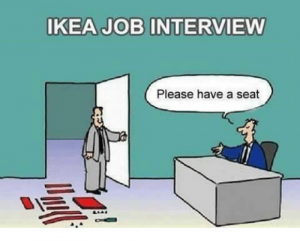
 This week I met with a promising new client. They have a handful of vacancies, one position that has been vacant for 3 months and another that they have interviewed 30 candidates for (yes, face to face) and still haven’t found the right candidate. Hmmmm…. Houston we have a problem!
This week I met with a promising new client. They have a handful of vacancies, one position that has been vacant for 3 months and another that they have interviewed 30 candidates for (yes, face to face) and still haven’t found the right candidate. Hmmmm…. Houston we have a problem!
The managers are pulling their hair out as it is taking too long to find and appoint talent and the HR team is frustrated that the leaders aren’t taking more ownership of the process. Clearly what they are currently doing is not working. They need to change and fast! It got me thinking about the basics of interviewing.
1. Prepare – have you read their resume prior to the candidate walking in the door? I remember years ago a client asked one of my consultants after an interview why the candidate was walking with a limp. On the resume it detailed his involvement in the Paralympics after having his leg amputated in an accident years earlier. It could have been an awkward moment if the client had asked the candidate directly or worse still…..made a joke about it! Reading all details on a resume allows you to be on the front foot (pardon the pun) and demonstrates to the candidate that you are interested in their background and are taking the process seriously.
2. Welcome – make sure the receptionist knows who will be arriving and at what time so the candidate can be greeted in a professional manner. I had a meeting the other week and within 3 seconds of walking in, the receptionist got up from her desk walked around to greet me by name and took me straight into a meeting room where I was offered tea, coffee or water. Wow! What a welcome. Simple, but so effective. I was immediately impressed. Also consider where you will be interviewing and make sure the environment is creating a great first impression, not like the other week when I observed dirty coffee cups from the last interview still on the desk!
3. Timing – a structured behavioural based interview should take 45 minutes to an hour. However, depending on the role and how many people are on an interview panel, interviews can blow out past this allocated time. Make sure you either stick to the schedule or have a fudge factor between candidates. Don’t make the mistake one large company made with one of my friends when his interview went over and on his way out he met the other candidate short listed for the role. He just happened to be an old colleague he had only spoken to days earlier for advice on the role! Awkward!
4. Icebreakers – I have observed many client interviews and it seems one of the hardest parts for people who don’t interview that often are the first 30 seconds to a minute. I have seen full silence where no one knows what to say through to immediate drilling of candidates with a barrage of questions. We need a warm up folks! No matter how experienced a candidate is, there is always going to be nerves, so having some small talk from reception to the meeting room is essential before settling into more of the formalities of the process.
5. 1st question – I know most inexperienced interviewers tend to run a less structured interview and that can be okay, but one word of advice, have your first question ready. Go for something open and general to get things moving for the candidate. I recommend so tell me about your current work situation or how is that you are in front of us today?
6. Technique – we all have our own styles and way of asking and extracting information, so when you get to the end of the hour to ensure you have got all the information you were after, have three areas to investigate – skills and experience (years, industry, qualifications, tasks), competencies (learned behaviors eg: communication, analytical skills) and finally motivation (rational and emotional) around why this job? Otherwise you risk an hour of chatting and getting off track, the result being that you can’t accurately assess the candidate’s suitability.
7. Close – winding up the discussion is just as important as the welcome. Thanking the candidate for their time, asking if they have any further questions and then telling them what the next steps will be in the process. I also like walking them to the door / lift, shaking their hand and encouraging them to call within the agreed timeframe. This leaves a lasting impression.
8. Summary/rating /concerns – once the candidate leaves, don’t answer the phone, check your emails or race off to your next meeting, take 10 minutes to write down your thoughts. Do a pros and cons list. What could this candidate bring to your business, what answers did they rate highly on? On the flip side, where are there still question marks that need to be flushed out. Give them an overall rating to compare with other candidates.
9. Response & speed – you know the biggest gripe from job seekers is that companies don’t get back to them. If you are going to the effort of interviewing someone face to face, then you should give them the courtesy of ringing them and telling them verbally why they didn’t get the job. Honesty and respect go a long way in building your reputation as an employer of choice. Speed is also another crucial ingredient to a successful interview process. Don’t wait 4 weeks to get back to people – trust me they will have forgotten you by then and probably taken a more attractive offer. Ask yourself what your expectations would be? 7 days at a maximum.
10. Feedback – don’t take the wimps way out and say “Sorry; there was a more suitable candidate.” No kidding!! That’s why you’re not offering them the job. But specifically what did that candidate demonstrate more effectively or what was missing? It is extremely rare for someone to get defensive if the feedback is delivered in an honest, genuine and specific manner. After all, anything that you can offer them to improve their chances next time will be appreciated.
Some of you may ask, “Why do all this if we don’t like the candidate and we know we aren’t going to hire them. Why go to all this effort?” One answer – market reputation. As much as you might find it easy to hire one person today, there is still a skills shortage and depending on roles, availability, timing or competition you might just find yourself in a situation of trying to attract talent to your organisation and role. It is still very much a two-way street in the employment market, so do your best to ensure the candidate leaves wanting the job, wanting to join the team and with an overall positive impression of their dealings and interaction with you and your company.
Interviewing is a skill. It takes time, practice and preparation to ensure it is an effective exercise that achieves the end result of assessing a candidate’s suitability for your vacancy.
Want your team to get the edge on interviewing techniques? Speak to Nicole about workshops and coaching programs here.


 Over the past few weeks I have met some amazing talent through my networks. These people are not active job seekers trawling the papers and websites looking for their next move – they are successful business people in their own disciplines who are open to being “shoulder tapped” for the right opportunity with the right organisation.
Over the past few weeks I have met some amazing talent through my networks. These people are not active job seekers trawling the papers and websites looking for their next move – they are successful business people in their own disciplines who are open to being “shoulder tapped” for the right opportunity with the right organisation.